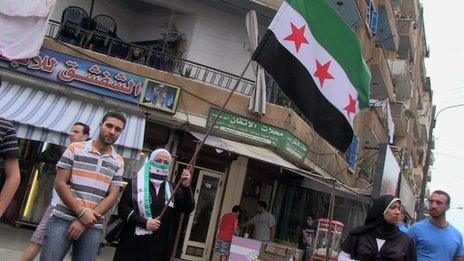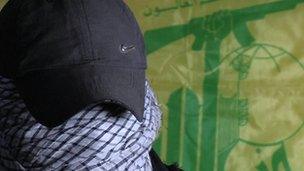Return to Lebanon: A country fighting someone else's war
- Published
Sectarian clashes have broken out in Lebanon
The civil war in Syria has threatened to spill over into neighbouring Lebanon, where the Damascus regime and the rebels both have supporters. I went back after decades of absence to try to find out how and why Lebanon, the country of my birth, is in danger of getting dragged into someone else's war.
In the 1970s and 1980s, as I was growing up, Lebanon was torn by civil war, which often pitched the Maronite Christian community against Muslims, both Shia and Sunni, and Druze.
Now conflict is looming again.
This time the divide is between Sunni Muslims - who mainly support the Syrian rebels - and Shia Muslims, who mostly back the regime in Damascus.
Last month the Lebanese Shia Muslim group Hezbollah admitted sending fighters to Syria to help President Bashar al-Assad's forces fight the mainly Sunni rebels.
But Hezbollah's intervention has caused a sectarian backlash across the region.
I travelled across Lebanon and met many impoverished Syrian refugees who were furious with Hezbollah for intervening in Syria.
But I also talked to a family whose son, Alaa, died in Syria fighting with Hezbollah.
Despite the overwhelming emotions of grief, loss and shock, I sensed they were consoling themselves with the idea that Alaa paid the ultimate price so the rest of his community would not have to.
Hezbollah fighters are very secretive and usually never speak to the media.
But after extensive negotiations with our contacts, I met one who had fought in the recent fighting in the Syrian town of Qusayr and was prepared to talk, as long as we hid his identity. He wanted to be called Mousa, Arabic for Moses.
He said Qusair was a bitter struggle. The town, strategically located near the Lebanese border, fell to government forces in June after weeks of intense fighting.
Mousa said: "The people we've been fighting were very aggressive, no pushovers. They've fought in Afghanistan, in Chechnya, Bosnia-Hercegovina, Libya, in Iraq - you name it.
"The battle was very aggressive, very kinetic, because you are fighting a radicalised enemy. They call themselves Muslims, but they believe only in themselves. They'll kill everyone else.
"They burn people, slaughter them. They are merciless and have no true religion. They carry the banner of Islam, but in reality they are defiling it. They distort the message that 'God is the greatest and Muhammad is his prophet,' no more, no less. They are takfiris [excommunicators]."
"But we dealt with them on the battlefield of Qusair, just as we'd deal with any terrorist militia anywhere, according to our training, because we are well trained for all combat scenarios," said Mousa.
I went to the southern city of Sidon where a Sunni Islamist group was holding a rally and concert in aid of the Syrian rebels.

Sunni residents of Tripoli waving a Free Syrian Army flag to show their support
Speakers denounced Hezbollah and singers sang in praise of the Syrian rebels.
Many people I spoke to believed Hezbollah's involvement in Syria was militarising and mobilising Lebanon's Sunni community.
These same groups rallied in support of Hezbollah a few years ago when they were battling the Israelis.
But Mousa said it was Lebanon's Sunni Muslims who had changed their position.
"Whom are we standing up for in Syria? It is the Syrian people and the government army," he said.
Mousa said: "There's a difference between supporting the Israeli plan for the region and the Syrian/Iranian plan of resistance. They are trying to exterminate this resistance. We shall fight wherever the battle takes us, whether to Qusayr, Aleppo or Baghdad to protect the resistance project with our blood."
The sectarian climate is affecting a whole generation.
Abu Khaled, a juice and coffee vendor, said the elders were losing control over the young, who were increasingly succumbing to more "extremist ideology".
He said the youth were "caught up in these cycles of action and reaction" and he blamed the media for encouraging them.

Mousa, a Hezbollah fighter, claims it is the Syrian rebels who are "radicalised terrorists"
Abu Khaled said: "To me, when I see the stuff in Syria, I'm old enough to handle it. But the kids see what's going on in Syria and say, 'Look what they are doing to us over there.' What can I say to that?"
When I talked to Sheikh Ahmad al-Assir, an outspoken anti-Hezbollah Sunni cleric in Sidon, before he went into hiding, I asked whether he thought what was happening in Syria could lead Lebanon into conflict.
He said: "Lebanon is already in a state of conflict. Especially after [Hezbollah leader Hassan] Nasrallah declared Hezbollah had entered a 'new chapter'. Maybe other politicians didn't think about this properly. But he was being honest. We have entered a new chapter - he moved thousands of troops to Syria."
How do you read this "new chapter"? I asked. "He's declared war against Sunni Muslims in the Islamic world," Sheikh Assir replied.
Hezbollah's leadership and its supporters insist their side does not want fighting inside Lebanon.
But while the political classes in Lebanon engage in a dangerous game of rhetoric and scaremongering, in a heavily armed society everybody seems to be preparing for when the storm finally hits home.
I've seen what can happen when sectarianism is used to mobilise and control communities: volatile situations can easily spin out of control.